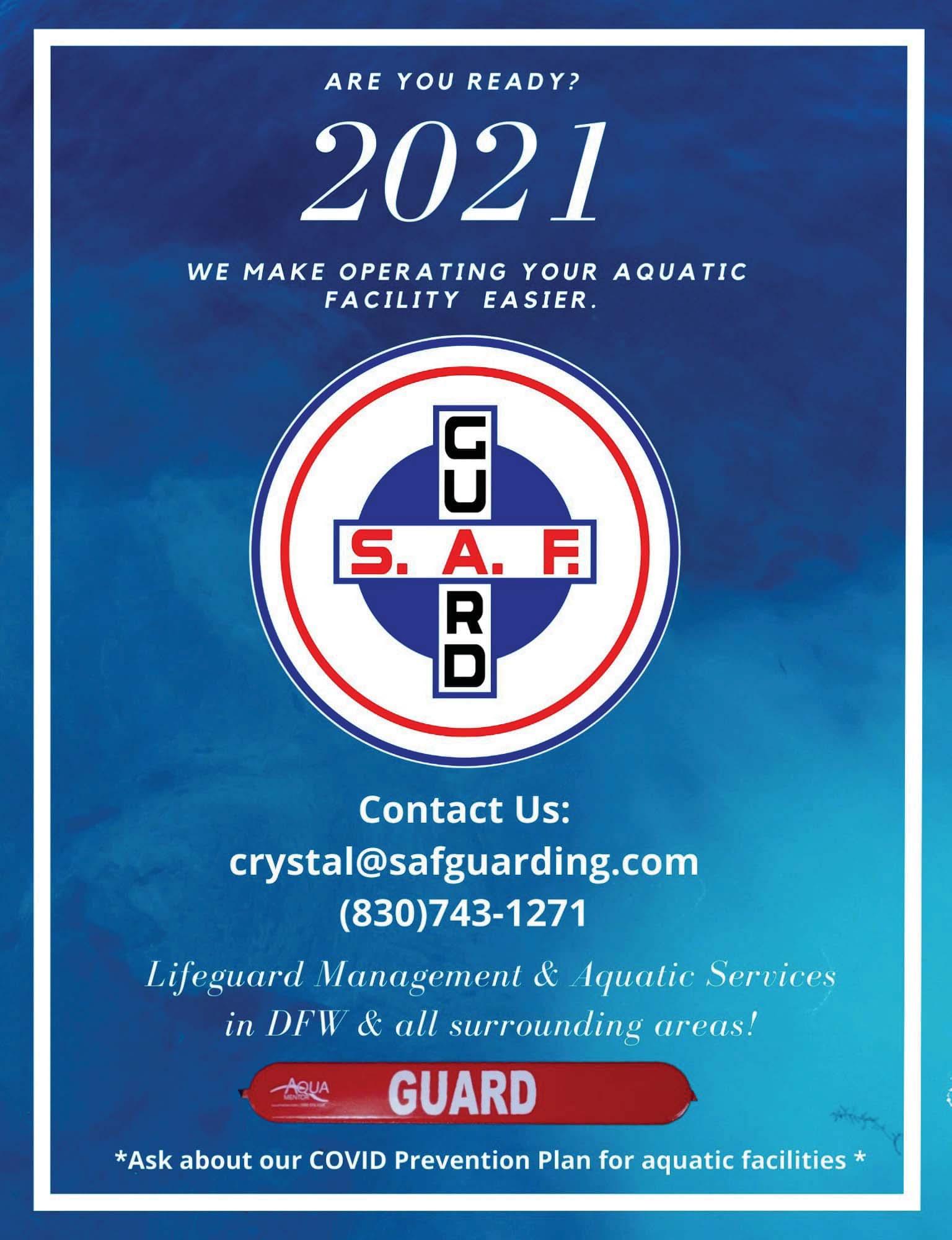
12 minute read
Safe Digging Begins with You
Every year, we support National Safe Digging Month in April. April typically marks the start of the spring planting season. But digging around the yard happens pretty much every month. The Damage Prevention Council of Texas wants to share important information with you how to protect yourself, your property and those around you. Remember that safe digging should happen year-round and no matter when you start your projects around the house, add 811 to the top of your to-do list.
How does adding 811 to my list help? It’s another step to getting my yard to award winning caliber. While it’s true that calling 811 does add another step to getting that perfect yard, it is the most important step you can take. Calling 811 before you dig for any reason saves lives, saves property, and it saves you from causing your entire neighborhood to be without power, internet or phone service. Imagine being without internet service, especially right now when so many people are relying on it to work from home or to home school their children. Losing internet or power will cause additional stress to everyone on your block.
Is it really that simple? Calling 811 can save all of this from happening? Yes, it is absolutely that simple. Call 811, just those three numbers and an agent will take your information. They’ll ask for your name, your project location, the type of work you are doing, what tools you’ll be using and how long you expect the work to take. Then what? Texas811 will notify the utilities that have underground lines in your project area. Please remember though, that you can’t yet dig. The Texas One Call Law requires a 48-hour waiting period between locate request submission and when digging begins, not including weekends and legal holidays. This gives the utility owners time to have their lines located and marked in your project area. After the utility locators have marked lines that are buried, you will receive an all clear to dig. Please be mindful of those marks as you dig, keeping a safe distance from those areas, you can now dig to plant that tree, set that fence post or install that sprinkler system. Calling 811 is a free service and it’s the law. That’s right, calling 811 before you dig doesn’t just apply to that construction company resurfacing the road you live on or the new housing addition going in up the road. It applies to anyone who puts a shovel to the ground. As you try to build that perfect paradise on your property for the coming months, remember no matter how big or small your project, calling 811 is your number one priority.. Please join us in doing it the right way. The safe way.
Jennifer Pratt, Program Manager Damage Prevention Council of Texas www.dpcoftexas.org


With this perspective, we see a critical mistake so many association boards make. In a desire to keep fees from going up, many association board set a course that will steer their association straight into the ditch.
Costs increase. This is an irrefutable fact of any modern economy. If your association fees have not increased AND have not increased in a substantive way, your association is likely headed into a vicious cycle that will require painful intervention to break.
HOW DOES IT BEGIN?
An association has annual operating expenses they incur every year. This includes things like mowing, utilities, cleaning, trash removal, insurance and other costs required to maintain daily operations. These expenses, which will eventually increase even after intense cost-conscious bidding and negotiating, must be funded annually or they are not received. Thus “keeping fees low” necessitates either abandoning those expenditures (at the cost of the appearance and performance of the association) or reallocating money intended for other purposes.
Pop Quiz!: “Where, within an association budget, can a board reallocate money to cover increasing annual expenditures without raising association fees?”. If you said “cut back on RESERVE FUNDING!” You’ve played this game before! While I haven’t done the statistical analysis, anecdotally I’m willing to bet 80% of all associations have made this very decision. (Note: If someone undertakes an actual statistical analysis, “bet the over” with respect to the real percentage.) Most associations have chosen to underfund their reserve in order to “keep fees low” today. The roof, the siding, the parking lot… Those expenditures only come up once every 20+ years. You can kick that can down the road for many budget cycles before “it” hits the fan.
All the motivation is there: “We have unit owners on fixed income”. “We want to keep fees low to help units sell”. “I just don’t want unit owners mad at me!”. This is how it begins.
THE VICIOUS CYCLE:
Operating costs increase over time, so the Association Board under funds reserves to “keep fees low” – Everyone is happy. Because of under funding, Reserve Fund is inadequate to fund major capital projects (roof) Association defers roof replacement because they didn’t have enough money and a special assessment wouldn’t be popular. NOT everyone is happy! Some unit owners who bought into well maintained and/or like-new condition condo do not want to sacrifice appearance and performance of their property just to save some nominal fee increases. Smart well funded owners see the writing on the wall and put their unit up for sale. The eventual buyers of listed units, by the very nature of the reality on the property, will be people who are willing to sacrifice property appearance for lower assessments. The property had some deferred maintenance, BUT the price was right and the fees were low so they bought. Association ends up with some unexpected expenses for water damage from roofs leaks. Finally replaces roofs 5 years later than they should have, spending more to re-deck the roof due to water damage. DISASTER AVERTED? NO! Siding is now looking really bad but the association doesn’t have the reserve funds to replace it. That’s OK! We’ve played this game before. DEFER SIDING replacement. Its only aesthetics! But now MORE people are unhappy.
SPIRALING OUT OF CONTROL:
The property is in trouble. They scraped together enough money to replace roofs (later than they should have) but the reserve fund is severely depleted. The siding looks terrible, and the property now has a significant deficit in “curb appeal” but they aren’t in a great place to remedy the situation. A special assessment would not be well received. When it came up at a board meeting the board members were afraid of making it back to their unit safely. The board Treasurer who saw this coming resigned. He doesn’t need the stress. The board, trying to be compassionate to unit owners who are on fixed incomes and very sensitive to fee increases, cuts back on operating costs to try to funnel money into the reserve. They extend the painting cycle. Property condition deteriorates even more. Over the past few years, the well funded

buyers saw what was coming and moved out. Unit sales prices declined significantly. Sellers took a hit because the property was now in poor condition, but they were relieved to get out of their unit. Any money they saved in lower association fees was negated by either seeing their investment fail to increase or worse yet, decline in value. Incoming unit owners are now EXTREMELY cost conscious, attracted to a lower sale price and lower fees to purchase a condo in a formerly sought-after association. They were eager to get into a unit for a “steal” and they could swing the low association fees as well. These unit owners will have a difficult time affording the “true” cost to live in their association, not to mention the cost to make up for 20+ years of underfunded reserve contributions. For all the effort to “keep fees low” the association has driven itself into the financial ditch. They were not frugal or fiscally responsible. They followed the path of least resistance and made a series of bad decisions each which made the financial situation worse and made the remedy more unattainable. The people who could have, and should have, contributed appropriately to fund reserves left new unit owners who tended to be more cost-sensitive (willing to accept a less attractive property because the “fees were low”) with a double whammy: The cost to maintain a property PLUS the cost to make up for 20+ years of under funded reserves. Congratulations board of directors! Your decisions, over time, resulted in a community full of residents who could not afford to live there. Most associations survive. Some do not. The properties that survive have a painful recovery that typically involves bank loans and fee increases but few return to their original glory. It didn’t have to be that way.
THE VIRTUOUS CYCLE:
In contrast to the above (all-to-common) scenario is an association that understands that “keeping fees low” should never be the primary goal of the board of directors. While a board can do its due diligence with vigorous bidding and negotiation of annual expenditures to ensure fee increases are not excessive, stable, and equitable, planned fee increases should not be avoided. Proper reserve funding ensures your association will remain a sought after property for generations to come. With the exception of construction defect issues and lengthy developer construction timelines (See Transition Defect Study and/or Retrospective Reserve Study) all associations start their journey in mint condition on sound financial footing. Notwithstanding legacy “drive-by boilerplate reserve studies” a quality detailed reserve study from an experienced provider is the first step to ensuring financial solvency *and* prosperity for your association. A quality reserve study is not a forgone conclusion. Boilerplate-type reserve studies give associations reason to question the results of the study which opens the door to inaction. Example: “The reserve provider didn’t even go up on the roof, how can they say it will only last 15 more years?”. Start with a quality reserve study in which you can trust the results. With every year that goes by without proper funding of reserves, your association increases the risk of falling into the vicious cycle described above.
EYES WIDE OPEN: An association that properly funds the reserve fund from the beginning will be giving current and future unit owners an accurate financial picture of what it truly costs to live in an association. In addition, as a result of having a quality reserve study, a board will be able to communicate to unit owners exactly what the fee schedule will look like for the next 5 years (the average useful life of a reserve study before an update is conducted). Proper reserve funding ensures that adjustments to the association fee schedule after a reserve study update will be minimal. Being new, the property is in top condition. A unit owner who, unfortunately, finds the monthly assessments difficult to afford will realize it very quickly and have the opportunity to sell their like-new unit, maximize sale price, and purchase a more affordable (for them) home. Prospective buyers will purchase a unit that is in like new condition with eyes-wide-open with respect to the true cost to live there and the planned inflationary assessment increases.
HAVE YOUR CAKE AND EAT IT TOO: The association is properly funded. The need for special assessments is virtually eliminated. Everyone who lives in the association understands the true cost to live there. Everyone is paying “a little more” than an association that is not funding their reserve, but they are enjoying a property that is in top condition. They enjoy the pleasing aesthetic value and

performance of properly maintained buildings. Their guests who visit see a beautiful property with great curb appeal. They minimize issues (and costs) from water infiltration and asset failure. That is ‘worry free’ living! When the time comes for select unit owners to sell, they will get TOP dollar for their unit. They enjoyed a great looking property the entire time they lived there, and they were rewarded for it with getting that money back in the form of a highly appreciated value of their asset on sale. They had their cake and ate it too. Your association will attract the kind of buyers you want in the property. Well funded unit owners who wanted a property in top condition and were willing to pay for it. Prospective buyers seeking “low condo fees”, thankfully, looked elsewhere.
When the time comes for planned projects the association has the funds to conduct roof replacements and siding replacements and parking area replacements as needed and without having to defer and sacrifice performance or aesthetic appeal. Everyone is happy. The virtuous cycle continues. Properly fund reserves, conduct projects in a timely manner, enjoy the beautiful property every day, and get rewarded with higher and higher unit sale prices. Who would chose to do it any other way? If your association is not properly funding the reserves, you will suffer the consequences. You cannot escape the consequences of underfunded reserves. You do not save money by under funding reserves and “keeping fees low”. You are not doing unit owners a favor by misrepresenting the true cost to live in an association and devaluing their most valuable asset with deferred maintenance. That is not compassionate. If you don’t fund your reserves you will pay for it through future special assessments, a lower sale price when you sell your unit, or both. Why not have your cake and eat it too?
If your association is not properly funding the reserves, you will suffer the consequences. You cannot escape the consequences of underfunded reserves. You do not save money by under funding reserves and “keeping fees low”. You are not doing unit owners a favor by misrepresenting the true cost to live in an association and devaluing their most valuable asset with deferred maintenance. That is not compassionate. If you don’t fund your reserves you will pay for it through future special assessments, a lower sale price when you sell your unit, or both. Why not have your cake and eat it too? © 2020 Nik Clark
about the author: Nik Clark is the President and Partner at Superior Reserve Engineering & Consulting. Nik has over 15 years of experience with community associations having held executive positions with a prominent legacy firm in the reserve study industry before founding Superior Reserve in 2014 to address the shortcomings of “boilerplate” and “drive by” reserve studies. Over the past 15+ years Nik has partnered with property managers, developers, association boards, and many other real estate fiduciaries to bring industry leading long-term capital reserve planning, transition, and related consulting services to all types of real estate. As a featured speaker and panelist at hundreds of industry conferences and trade shows around the country, Mr. Clark has been a resource for managers, real estate executives, and properties in all 50 states and 36 countries.




